
Report by Mohammed Attia
EgyptAir celebrated its ninety-second anniversary on Tuesday, May 7th, marking the establishment of the national company in 1932 as the first airline in Africa and the Middle East, and the seventh globally. Under the leadership of Engineer Yahya Zakaria and in accordance with the instructions of Captain Mohamed Abbas Helmy, Minister of Civil Aviation, the company has continued its plans for development, fleet support, and reaching new destinations in recent years. The company’s development was evident at the Dubai Airshow 2023, where it announced several new contracts to modernise its fleet, including a significant agreement with Air Lease Corporation for the operational lease of 18 new Boeing 800-787 “Dreamliner” aircraft. This deal, the first between Air Lease Corporation and EgyptAir, will see the delivery of the first aircraft starting in 2025, with the rest to follow gradually by the end of 2026.

EgyptAir also announced during the Dubai Airshow the signing of a new deal to purchase 10 new Airbus A350-900 aircraft. The A350-900 aircraft, upon joining the company’s fleet, will reduce fuel consumption by 25% and thus lower carbon emissions resulting from flights. Passengers aboard these aircraft will enjoy the best travel experiences thanks to the distinctive “AirSpace” cabin from Airbus, which provides spacious luggage compartments and other comforts. With this deal, EgyptAir’s total fleet is expected to reach 108 aircraft by the end of 2026, with the current fleet consisting of 80 aircraft, including 42 Boeing models.

The Dubai Airshow also saw the signing of an agreement for the maintenance and repair of some of EgyptAir’s aircraft units with Honeywell. The agreement was signed by Waleed El-Khefeif, President of EgyptAir Maintenance & Engineering, and Ryan Lees, President of Aftermarket Services for Europe, Middle East, Africa, and Central Asia at Honeywell. This agreement aims to ensure the safety of EgyptAir’s aircraft primarily through Honeywell’s services, to maintain the fleet’s operation continuity at the highest level of quality and efficiency, and to ensure the safety and comfort of passengers.
Additionally, EgyptAir has been striving to comply with all aviation safety standards, including passing a risk assessment of all its activities in collaboration with GHS, an American company. GHS reviewed all activities related to insurance, safety, and aircraft service carried out by EgyptAir Holding Company and its subsidiaries. GHS confirmed that EgyptAir implements all activities in accordance with the regulations and legislation of the Egyptian Civil Aviation Authority and aligns with best practices in the aviation industry.
EgyptAir also announced the signing of a memorandum of understanding with Rolls-Royce for comprehensive engine care services, including maintenance for 20 Trent XWB-84 engines operated by the recently contracted Airbus A350-900 fleet. This agreement enables EgyptAir to predict and budget the cost of fleet maintenance services.
Furthermore, EgyptAir signed an agreement with Panasonic Avionics Corporation for in-flight entertainment and communication systems on its new Airbus A350-900 aircraft to operate the “Astrova” programme, revolutionising aviation. With this agreement, EgyptAir becomes the first airline in Africa to choose the Astrova system. Astrova will be implemented in the business class with 19-inch OLED screens and in economy class with 12-inch screens, along with Panasonic’s communication services on all EgyptAir’s A350 aircraft. Astrova enhances airlines’ opportunities to interact with passengers, creating an exceptional experience with high-quality display screens, high-definition sound accessible via Bluetooth, and direct current power of up to 100 watts through USB-C ports in passengers’ seats for fast charging of smartphones and around 90% of laptops worldwide. The new Astrova programme for in-flight entertainment systems also features programmable LED lighting to enhance passengers’ experience on EgyptAir flights.
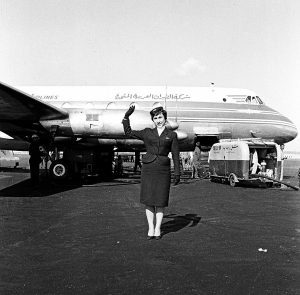
The EgyptAir Training Academy has also succeeded for the twenty-third consecutive year in renewing the accreditation of the European Aviation Safety Agency (EASA) for its flight simulators of the following Airbus models: A220/300, A320/200, A330/200, and A340/300, at the highest qualification levels. This reaffirms the vital and pioneering role of the academy as a regionally and internationally accredited training centre. Captain Walid Suleiman, the head of EgyptAir Training Academy, emphasised that this renewal marks another milestone in the academy’s achievements. The academy is keen on renewing these accreditations to compete strongly with many global and Middle Eastern aviation training academies and centres, especially those in Europe, which require these international accreditations for any new co-operation or agreements. These accreditations represent a strong addition to EgyptAir Training Academy’s capabilities.
Moreover, in recent times, EgyptAir has launched several international flights, starting with its first direct flight to Port Sudan, flight number MS856, carrying 120 passengers. This new route was opened after the airspace for East Sudan was opened, supporting the company’s ambitious expansion plan within the African continent. Additionally, EgyptAir inaugurated its first direct flight between Cairo and Sao Paulo, Brazil, flight number MS3910, using the latest B787-9 Dreamliner aircraft. This flight marks the first in the company’s history for this route, with EgyptAir operating a special flight to Sao Paulo every two weeks.
Furthermore, EgyptAir has recently added new routes to its network, including Dhaka, Bangladesh, and Newark, New Jersey, in North America. Additionally, the company announced the operation of its latest routes to Manchester, England, and Delhi, India, as well as Shanghai, China. These new routes represent additional expansion points for EgyptAir’s network in Asia and Europe, serving new customers worldwide.
On another note, the Duty Free Company, under the leadership of Saad Mabed, witnessed a comprehensive development plan at all levels. After a period of noticeable recession due to the Covid-19 pandemic and its negative impact on all civil aviation sectors and companies, the company began a recovery plan. The most important aspect of this plan was activating the digital system, which had been postponed for over two years due to the Covid-19 pandemic. The new system, SAP, represents a digital revolution in the Duty Free Company, aiming to provide excellent service to passengers while permanently stocking goods in duty-free outlets, giving a positive impression to Egypt’s guests about the national company and Egypt in general.
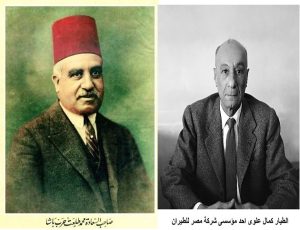
*Establishment Idea*
The idea of establishing a national airline company began to emerge in the 1920s, adopted by the prominent economist Talaat Harb, who took on the task of realising the dream of individual attempts by some Egyptian youth at that time to establish an Egyptian civil aviation company.
Among these attempts was Kamal Elwi, who traveled to Paris in 1929, learned aviation skills there, and bought an airplane, which was the first to be registered in Egypt and bore the registration letters SU-AAA. He later gifted it to EgyptAir.
Then the idea of establishing EgyptAir began to take shape in the minds, especially with the success of pilot Mohamed Sedky as the first Egyptian pilot to fly his plane “Princess Fayza” from Berlin to Cairo on January 26, 1930, the day we celebrate Civil Aviation Day.
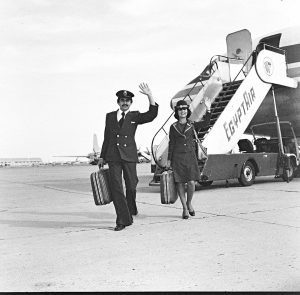
*Royal Decree*
Indeed, Kamal Elwi, Mohamed Sedky, and Talaat Harb co-operated to realise the dream through Banque Misr, and their efforts resulted in the issuance of the royal decree on May 7, 1932, establishing EgyptAir. The company was named as “Misr Airwork,” and the founding contract stipulated that Egyptians own at least 60% of the shares. The company’s capital was initially set at twenty thousand pounds.
Although the company’s start was focused on training and excursions at Almaza Airport, it quickly began to form the first nucleus of its fleet. On June 30, 1933, EgyptAir received its first two “De Havilland Dragon 84” aircraft, each carrying four passengers, as the nucleus of its fleet. Its first flights were to Alexandria and Marsa Matruh.
The company’s business jewel at that time came when it operated its first flights to Jeddah and Medina in 1936, making EgyptAir the first airline in the world to land in both cities.
After World War II in 1939, the company entered a new phase in its history, with its capital becoming entirely Egyptian after the withdrawal of the British partner Airwork and Egyptians replacing the British to make everything Egyptian. Its name was changed to EgyptAir Airlines in 1941.
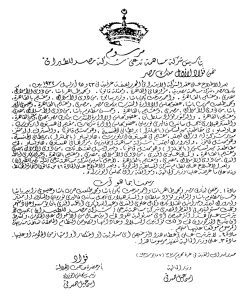
*Great Leap*
In 1980, Engineer Mohamed Fahim Riyan became the General Commissioner of EgyptAir, then assumed the presidency of its board of directors in 1981 until 2002, during which EgyptAir witnessed several successes. The fleet expanded in a way unprecedented in EgyptAir’s history at that time. Eight Airbus A300-B4 aircraft were purchased to cover European and Middle Eastern markets, followed by three long-range Boeing 767/200 aircraft, and then two Boeing 767/300 aircraft to meet the increasing transport demands of distant markets. Following that, seven new Airbus A320-200 aircraft were purchased to serve Egypt’s tourist attractions and transport tourism directly from abroad. The company also purchased five new Boeing 737/500 aircraft, in addition to three Boeing 777/200 aircraft and three Airbus A340-200 ultra-long-range aircraft to meet the demands of the North American and Japanese markets. This was followed by the purchase of four Airbus A321-200 aircraft to serve the new and promising charter aviation market. Thus, the total cost of fleet renewal and replacement operations for the company amounted to over $3.112 billion.
The January 25 Revolution had negative repercussions that affected the company, as the tourism rate decreased significantly due to the unstable situation. The company incurred significant losses, reaching 10 billion pounds over five years due to reduced operations and political events and wars in the Arab region, which led to the closure of some routes. EgyptAir conducted many tourism promotion campaigns to revive tourism in an attempt to regain its operational rate on its flights.
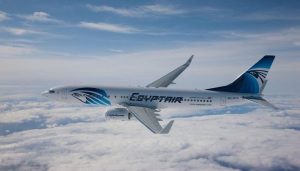
*National Role*
During crises and disasters, the national role of EgyptAir emerges, as evidenced during the spread of the coronavirus, where EgyptAir and Air Cairo organised hundreds of exceptional flights transporting 77,000 stranded individuals from around the world in coordination with the Ministries of Foreign Affairs and Immigration. Due to the political events in Libya, EgyptAir organised flights that transported approximately 12,000 Egyptians, and the same was done to transport stranded individuals in Syria. The latest of these humanitarian flights was after the outbreak of the war in Ukraine, organising a number of flights to Poland and Romania to transport stranded Egyptian students there after crossing the Ukrainian borders to those two countries.



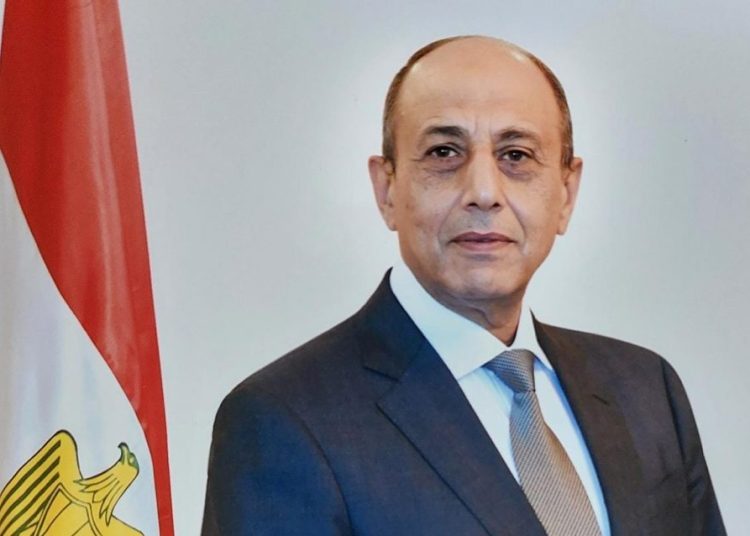


Discussion about this post